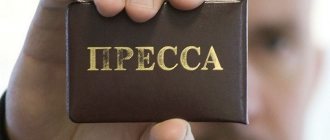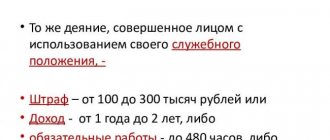ST 169 of the Criminal Code of the Russian Federation.
1. Unlawful refusal of state registration of an individual entrepreneur or legal entity or evasion of their registration, unlawful refusal to issue a special permit (license) to carry out certain activities or evasion of its issuance, restriction of the rights and legitimate interests of an individual entrepreneur or legal entity, depending on organizational and legal form, as well as illegal restriction of independence or other illegal interference in the activities of an individual entrepreneur or legal entity, if these acts were committed by an official using his official position, -
shall be punishable by a fine in the amount of two hundred thousand to five hundred thousand rubles, or in the amount of the wages or other income of the convicted person for a period of up to eighteen months, or by deprivation of the right to hold certain positions or engage in certain activities for a term of up to three years with a fine in the amount of up to eighty thousand rubles, or in the amount of wages or other income of the convicted person for a period of up to six months, or by compulsory work for a period of up to three hundred and sixty hours.
2. The same acts committed in violation of a judicial act that has entered into legal force, as well as causing large-scale damage, -
shall be punishable by deprivation of the right to hold certain positions or engage in certain activities for a period of three to five years with a fine in the amount of up to two hundred and fifty thousand rubles or in the amount of the wages or other income of the convicted person for a period of up to one year, or by compulsory labor for a term of up to four hundred and eighty hours. , or forced labor for a term of up to three years, or arrest for a term of up to six months, or imprisonment for a term of up to three years.
Note. In this article, major damage is defined as damage the amount of which exceeds one million five hundred thousand rubles.
Commentary to Art. 169 Criminal Code
1. The objective side of obstructing legal business or other activities is described in the law using five alternative actions and two forms of inaction by an official.
2. The law includes among the actions:
a) unlawful refusal of state registration of an individual entrepreneur or legal entity. Refusal on legal grounds is possible in the following cases (see Article 23 of the Federal Law of August 8, 2001 N 129-FZ “On State Registration of Legal Entities and Individual Entrepreneurs”): a) failure by the applicant to submit the documents necessary for state registration; b) submission of documents to an improper registration authority; c) failure to comply with the notarial form of the submitted documents in cases where such form is required; d) signing by an unauthorized person of an application for state registration or an application for amendments to information about a legal entity contained in the Unified State Register of Legal Entities; e) withdrawal of participants of a limited liability company from the company, as a result of which not a single participant remains in the company, as well as withdrawal of the only participant of a limited liability company from the company, etc.;
b) unlawful refusal to issue a special permit (license) for the right to carry out certain activities. Federal Law No. 99-FZ of May 4, 2011 “On licensing of certain types of activities” established a list of types of activities for which a permit (license) is required, the licensing procedure, deadlines (5 days from the date of receipt of the application for a license with all necessary documents), and also enshrined in paragraph 7 of Art. 14 grounds for legal refusal to issue a license. These include: a) the presence of unreliable or distorted information in the license application submitted by the license applicant and (or) the documents attached to it; b) the non-compliance of the license applicant with the licensing requirements established during the inspection; c) the presence in relation to the license applicant of a decision to cancel a previously issued license for this type of activity;
c) restriction of the rights and legitimate interests of an individual entrepreneur or legal entity depending on the organizational and legal form means a discriminatory approach to various economic entities. It can be expressed, for example, in a ban on issuing licenses for a certain type of activity to everyone, with the exception of municipal unitary enterprises, etc.;
d) restriction of independence or
e) other illegal interference in the activities of an individual entrepreneur or legal entity. The law does not specify the types of interference in the activities of an individual entrepreneur or legal entity. Therefore, they can be anything, but they are not necessarily based on the current law. For example, a ban on concluding agreements with certain entrepreneurs for the sale of goods, establishing a maximum volume of production or sales of products, forcing the appointment of certain persons to various positions, etc.
3. The law defines inaction as: evasion of state registration of an individual entrepreneur or legal entity or the issuance of a special permit (license). In these forms, the crime will be considered completed from the moment the deadlines established for registration or issuance of a license expire, provided that there are legal grounds for committing these actions.
4. A mandatory feature of the objective side is the method - the use by an official of his official position, i.e. those powers, as well as authority, that a person has by virtue of his position to commit a crime.
5. If the obstruction of legal business activity continues after a court decision determining the illegality of the official’s actions (Part 2 of Article 169 of the Criminal Code), then another official may also be the subject of the crime; it is only necessary that it be aware of the existence of a corresponding court decision that has entered into legal force.
6. The large amount of damage is expressed both in the form of real material damage and mainly in the form of lost profits. In total it must exceed 1.5 million rubles.
7. The guilt of an official in relation to the damage caused by his actions can be either intentional or careless.
Depraved acts (Article 169 of the Criminal Code). Current issues.
lawyer Moshkin Vitaly Vitalievich, December 06, 2019 Phone: 375296252237
Minsk City Bar Association, Legal Consultation of the Sovetsky District
At first glance it may seem that regarding Art. 169 of the Criminal Code (Depraved acts) everything is more or less clear, and in this regard there are no significant problems, both in terms of what it is, qualifications, and in the means and methods of proving this fact or the opposite. However, this is not the case. According to the disposition of Part 1 of Art. 169 of the Criminal Code, these are indecent acts committed by a person who has reached the age of eighteen, against a person who has obviously not reached the age of sixteen, in the absence of signs of crimes provided for in Articles 166, 167 and 168 of the Criminal Code. The particular relevance of the issue under consideration is given by the fact that, on the one hand, the Belarusian law classifies this crime as a less serious crime, including those falling under the scope of the latest amnesty law in connection with the 75th anniversary of the liberation of the Republic of Belarus from the Nazi invaders (Part 1 Art. 169 of the Criminal Code), and on the other hand, due to the development of information technology, the availability of various mobile devices for accessing the Internet by many under 16 years of age, the methods of committing this crime have expanded significantly. The information that is overloaded on the Internet and the rapid informatization of the population do not help reduce the number of such manifestations. It is also no secret that often, from depraved acts to the commission of any sexual relations, there is a very short step between the one who commits them and the victims.
The relevance of this issue is given by the fact that, for example, in the Russian Federation, a similar article (Article 135 of the Criminal Code of the Russian Federation) underwent significant changes in 2012, namely, part two was changed, and also parts three, four and five were added. In particular, the commission of indecent acts against two or more persons or by a person previously convicted of indecent acts is already a particularly serious crime. In a number of other countries, such acts are also classified as more serious categories of crimes. Therefore, it is not a fact that over time our legislator will follow the path of tightening responsibility for these acts.
So, first things first. To the problem of qualification of the act. There are two main problems here:
First, did the suspect (accused) know that he was committing these actions against a person KNOWING for him to be under 16 years of age? This is fundamentally important, since the fact of depraved acts in itself does not constitute a crime.
Second – what are indecent acts? And here in practice various problematic issues arise. Thus, some investigators in the decision to charge as an accused indicate such wording as “had a negative impact on the normal moral and physical development of a minor” or “expressed in opposition to his desire to satisfy sexual passion with the moral and physical development (of the victim (him, them)" In fact, this, in my opinion, is not always correct and correct, since Part 1 of Article 169 of the Criminal Code is a formal structure and does not require the occurrence of certain negative consequences.According to paragraph 17 of the Resolution of the Plenum of the Supreme Court of the Republic Belarus dated September 27, 2012 No. 7 “On judicial practice in cases of crimes against sexual integrity or sexual freedom (Articles 166-170 of the Criminal Code), depraved actions (Part 1 of Article 169 of the Criminal Code) should be understood as non-violent, not related with sexual intercourse and other actions of a sexual nature, influence on a person of any sex, who is known to the accused to be under the age of sixteen, aimed at arousing his interest in the sexual aspects of life, sexual desire.
In this regard, the mere fact of whether or not the accused had a negative impact on the normal mental or physical development of a person under 16 years of age, etc., as well as the motive for committing such acts, does not matter for the qualification of the act. It can and should be important only for the measure of responsibility for the act, since this directly depends on the size of the harmful consequences (harm) caused by the crime (clause 4, part 1, article 89 of the Criminal Procedure Code, article 62 of the Criminal Code), and also directly affects the amount of the subject compensation for moral damage, if any is presented to the accused.
On problems of proving or refuting this fact (crimes under Article 169 of the Criminal Code). At first glance, everything seems to be clear here, however, even here questions arise about what can be classified as depraved actions and what is not. In this regard, in various comments to the Criminal Code there are statements that in this regard it is necessary to order a forensic sexological examination. However, it is not. The fact is that such examinations are not carried out in the Republic of Belarus, because The concept of indecent acts refers to issues of legal qualification. An example from my own practice. A man who arrived in Minsk began communicating through social networks with various people on all kinds of intimate topics. Moreover, he did it so openly that it could not raise doubts about what kind of topic it was and what it was aimed at, the communication between him and other persons was so direct and open. The investigator conducted an investigation, considered the guilt of the accused established and sent the case to the prosecutor for sending to court. However, the prosecutor returned the case for additional investigation, considering it necessary to conduct a forensic sexological examination to determine the presence or absence of depraved acts in this communication. As a result, an examination was appointed, its implementation was entrusted to the State Committee for Forensic Expertise, however, according to the conclusion of the forensic expert, its implementation is not within the competence of the forensic expert, because The concept of indecent acts refers to a legal concept. A forensic expert called by the court in the same case explained the same thing to the court. Thus, time is wasted, and most importantly, this imposes a special responsibility on the criminal prosecution body to correctly investigate the case and competently give a legal assessment of such acts, distinguishing depraved actions (if any took place) from those that do not apply to them.
It is also necessary to distinguish depraved acts that can only be committed with direct intent, from various kinds of jokes, banter, etc. aimed at an indefinite number of people.
I am lawyer Vitaly Vitalievich Moshkin.
cont. (Viber) +375296252237 Blog Moshkin Vitaly Vitalievich
Second commentary to Art. 169 of the Criminal Code of the Russian Federation
1. The composition protects the legal, i.e. entrepreneurial or other activities carried out in accordance with the legislation of the Russian Federation.
2. The concept of entrepreneurial activity is given in Art. 2 GK. She:
1) represents an independent initiative activity;
2) carried out by the subject on its own behalf, at its own risk, under its own property liability;
3) aimed at generating profit, which is the goal of economic activity;
4) carried out on a permanent (professional) basis.
3. Other activities can be any (social, charitable, political).
4. The objective side is the obstruction of legitimate business or other activities.
5. Forms of criminal obstruction:
1) unlawful refusal to register an individual entrepreneur or legal entity;
2) evasion of their registration;
3) unlawful refusal to issue a special permit (license) to carry out certain activities;
4) evasion of its issuance;
5) restriction of the rights and legitimate interests of an individual entrepreneur or legal entity depending on the organizational and legal form;
6) illegal restriction of independence or other illegal interference in the activities of an individual entrepreneur or legal entity.
6. Obstruction of legitimate business or other activities is completed from the moment the act is committed.
7. The subjective side under Part 1 of the article is characterized by direct intent.
8. The subject of obstruction is an official if he uses his official position.
9. Qualifying characteristics are provided for in Part 2 of the article.
Judicial practice under Article 349 of the Criminal Code of the Russian Federation
Determination of the Constitutional Court of the Russian Federation dated January 16, 2018 N 7-O By
the verdict of the Novorossiysk Garrison Military Court dated November 9, 1999, B. was found guilty of committing a crime provided for in part one of Article 349 of the Criminal Code of the Russian Federation (violation of the rules for handling weapons and items representing an increased danger to others, resulting through negligence in causing grievous harm to human health), and was sentenced to six months of detention in a disciplinary military unit (suspended).
Appeal ruling of the Judicial Collegium for Criminal Cases of the Supreme Court of the Russian Federation dated June 25, 2019 N 5-APU19-55
By a resolution of the Deputy Prosecutor General of the Russian Federation dated April 2, 2022, the request of the Prosecutor General's Office of the Republic of Belarus for the extradition of Bogdan Z.P. was satisfied. law enforcement agencies of the Republic of Belarus to bring him to criminal liability under Part 2 of Art. 349, part 4 art. 209 of the Criminal Code of the Republic of Belarus.
Determination of the Judicial Collegium for Civil Cases of the Supreme Court of the Russian Federation dated 09/07/2020 N 49-КГ20-10
On April 30, 2002, assistant military prosecutor (military unit 20102) on the fact of the fatal wound of a soldier of military unit 29483 Nizamutdinov R.R. and causing injuries of varying degrees of severity to servicemen of the same unit S. and ... N. against junior sergeant ... N. a criminal case was initiated on the grounds of a crime under Part 2 of Article 349 of the Criminal Code of the Russian Federation (violation of the rules for handling weapons and objects, posing an increased danger to others, resulting in the death of a person through negligence). During the investigation of this criminal case, it was established that the death of Nizamutdinov R.R. was the result of a violation of the rules for handling a serviceman of military unit 29483 ... N. with a live grenade.
What is considered attempted rape?
Before explaining the concept of “attempted rape,” it is necessary to define what constitutes rape.
Thus, rape is the fact that one person (the rapist) has sexual intercourse with another person (the victim) against his will, using physical violence or psychological pressure (threats, humiliation).
As for attempted rape, it represents failed sexual intercourse, preparation for a criminal act and direct attempt.
Read here what to do if you are accused of rape.






